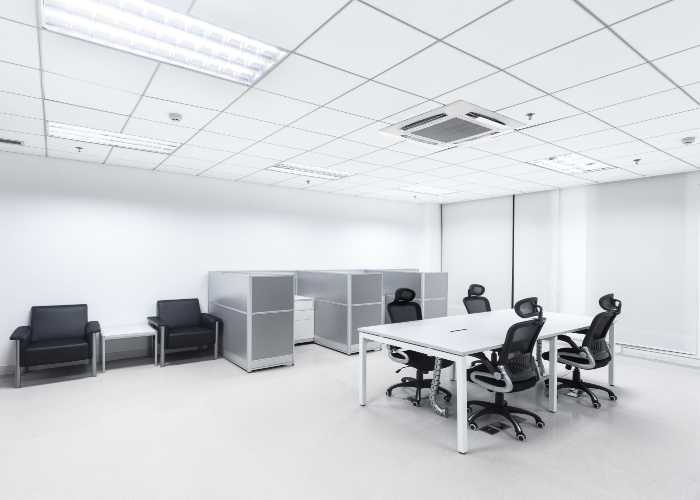Whether in an office building, retail store or hotel, zone cooling systems offer an efficient and effective way to cool commercial spaces. By providing a flexible approach to temperature control, this technology maximises comfort while minimising energy consumption.
But before we dive into its benefits, what do we actually mean by zone cooling?
Zone cooling is a method of air conditioning that divides a commercial space into distinct zones or areas, each with its independent temperature control. Instead of relying on a central thermostat that regulates the temperature for the entire space, zone cooling uses multiple thermostats or controls strategically placed in different zones.

To achieve this, the commercial space is divided into zones based on factors such as occupancy patterns, usage requirements, or specific temperature preferences. Each zone is equipped with its thermostat or control system, allowing for precise temperature adjustments according to the needs of that particular area.
Zone cooling systems employ a combination of equipment, such as dampers, ductwork, and sensors, to ensure efficient cooling in each zone. Dampers control the airflow to specific zones, directing cool air where it’s needed and reducing airflow to unoccupied or low-priority areas.
These systems can be integrated with advanced technologies - such as smart thermostats or building automation systems - to enhance control and monitoring capabilities. This integration allows for remote access and scheduling, optimising energy usage and providing real-time data on temperature settings and energy consumption.
One of the key advantages of zone cooling is the ability to have independent temperature control in different areas of a commercial space.
Traditional central air conditioning systems often fail to provide consistent comfort levels throughout a building. However, with zone cooling, specific areas can be individually adjusted to meet the temperature preferences of the occupants. This level of customization ensures that employees, customers, or visitors can enjoy optimal comfort in their respective areas.
Consider a large office space where different teams have varying temperature requirements. With zone cooling, each section of the office can be controlled separately, allowing employees to set temperatures that suit their preferences. Similarly, in retail spaces or conference rooms, zone cooling enables precise temperature adjustments to cater to the specific needs of the occupants.
Zone cooling goes beyond merely providing customised temperature control; it significantly enhances comfort levels for individuals in commercial spaces.
Consistent temperature distribution throughout different zones ensures that occupants no longer experience hot or cold spots, creating a comfortable and inviting environment. This improvement in comfort has a direct impact on employee morale and productivity.
Zone cooling systems are also designed to adapt to changing conditions. For instance, during the summer months when external temperatures rise, the cooling capacity can be increased in high-occupancy areas - such as meeting rooms or break areas - to counterbalance the heat generated by a larger number of people. This adaptability ensures that comfort levels are maintained, regardless of external factors or varying occupancy rates.

Energy efficiency is a critical concern for commercial spaces, and zone cooling provides an effective solution to reduce energy usage compared to traditional central air conditioning systems. By only cooling specific areas that require it, energy is not wasted on unoccupied or low-traffic zones.
Zone cooling systems also incorporate load balancing techniques, which ensure that the cooling load is evenly distributed across different areas. This optimization prevents overcooling or undercooling in specific zones and reduces overall energy consumption.
In addition, advanced features such as occupancy sensors can be integrated into zone cooling systems, allowing for automatic adjustments based on occupancy levels. During non-peak hours or when an area is unoccupied, temperature setbacks can be implemented, further conserving energy.
One of the most compelling advantages of zone cooling is the potential for cost savings - by improving energy efficiency, businesses can significantly reduce their utility bills.
The reduced energy consumption achieved through zone cooling translates into tangible cost savings over time. So while the initial installation costs may be higher compared to traditional systems, the long-term benefits and return on investment make zone cooling an economically viable choice.
In addition to lower energy costs, businesses can benefit from decreased maintenance and repair expenses. Zone cooling systems are designed to be efficient and reliable, resulting in fewer breakdowns and repairs. What’s more, the ability to control and monitor each zone individually allows for proactive maintenance, identifying and resolving issues before they escalate, ultimately minimising downtime and associated costs.
Zone cooling systems can be implemented in both new construction projects and existing buildings. For new constructions, the system can be designed and installed during the initial HVAC setup, whilst retrofitting existing buildings with zone cooling may require modifications to the existing HVAC infrastructure, such as adding dampers and reconfiguring ductwork.
The initial installation costs may be higher compared to traditional air conditioning systems - particularly for retrofitting existing spaces - however, it’s essential to view this as an investment that will yield long term benefits in terms of comfort, energy savings, and cost reductions.
To ensure optimal performance, it’s crucial to consult with professionals experienced in zone cooling system design. They can assess the specific requirements of a commercial space and develop a tailored solution that maximises this cooling technology.
